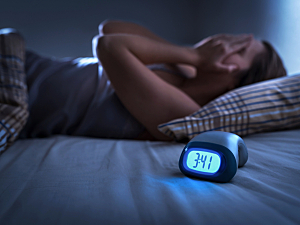About half of women report increased disruption of sleep continuity during the perimenopause: more nightly awakenings and greater wakefulness after sleep disruption. Previous research, published in Sleep, at Brigham and Women’s Hospital has shown sleep discontinuity can’t be attributed entirely to nighttime vasomotor symptoms (VMS).
Jamie Coborn, PhD, a research fellow in the Department of Psychiatry at the Brigham, Hadine Joffe, MD, executive director of the Mary Horrigan Connors Center for Women’s Health and Gender Biology, and colleagues have published empirical evidence that changing hormone dynamics underlie awakenings in perimenopausal women, independent of VMS. Their report appears in The Journal of Clinical Endocrinology & Metabolism.
Methods
The team conducted a secondary analysis of data from a Brigham study of female reproductive hormones and depressive symptoms in 50 perimenopausal women ages 35 to 56, published in The Journal of Clinical Endocrinology & Metabolism. Unmedicated women with mild to moderate depressive symptoms had nine weekly serum measurements of estradiol, follicle-stimulating hormone (FSH), and progesterone, and depressive symptoms were rated weekly by a clinician.
The study participants were asked to continuously complete sleep and VMS diaries for eight weeks. 45 women had complete sleep diary data and were included in the new analysis. Their mean age was 49; most were white (58%) or Black (38%).
Sleep Continuity and Reproductive Hormones
After adjustment for covariates linked to sleep discontinuity (e.g., nighttime VMS, depressive symptoms, body mass index, and age), two hormone measures were significantly associated with more nightly awakenings:
- Estradiol in the postmenopausal range—β, 0.14; 95% CI, 0.04–0.24 (P=0.007); associated with an average of 0.18 more awakenings per night relative to study participants with higher estradiol levels
- Higher FSH levels—β, 0.12; 95% CI, 0.02–0.22 (P=0.02); a 1–standard deviation increase (37.2 IU/L) was associated with an average of 0.16 more awakenings per night
Progesterone levels were not associated with the number of awakenings, and there was no association of any reproductive hormone level with wakefulness or sleep-onset latency. The results were unchanged by substituting daytime VMS for nighttime VMS.
Sleep Continuity, VMS, and Depression
In the adjusted model:
- The number of nightly awakenings was significantly associated with nighttime VMS (β, 0.14; 95% CI, 0.02–0.26; P=0.03)
- Wakefulness and sleep-onset latency were not associated with nighttime VMS
- No sleep continuity parameter was associated with the severity of depressive symptoms
Relevance to Patient Care
Clinicians should understand midlife women may have disrupted sleep even if they don’t report nighttime VMS or depressive symptoms. Sleep discontinuity not only reduces quality of life but also increases the risk of cardiovascular disease and depression, diseases that have already become more prevalent in women during perimenopause.
Estradiol therapy might benefit perimenopausal women regardless of its effects on VMS.
